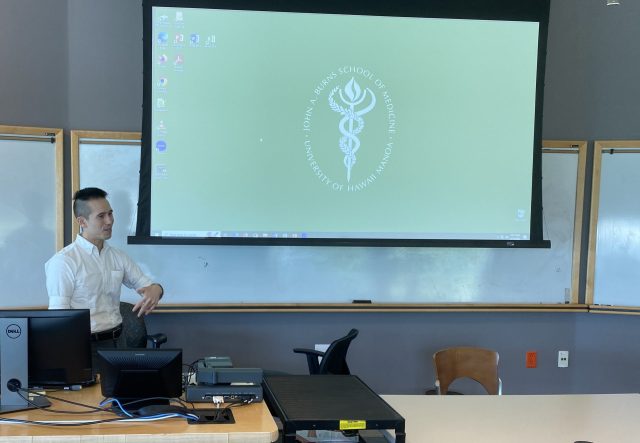
In an intimate, small group conversation, Victor A. Ruthig, PhD returned to JABSOM last Friday to share some secrets of being a post-doc in Hawaiʻi.
Ruthig, now doing a second postdoctoral at the Weill Cornell Medicine Genitourinary Development and Fertility program, spent five years at JABSOM researching Y chromosome genetics, male fertility, male anatomy and male development work. Ruthig, a Developmental and Reproductive Biology (DRB) graduate student, was mentored by Dr. Monika Ward and worked closely with the Institute for Biogenesis Research.
While Ruthig worked in JABSOM’s anatomy lab and did mouse genetics research at UH Mānoa, his talk on Friday focused on the personal and professional balance he navigated.
Knowing that many other post-docs share similar experiences, Ruthig wanted to share the things he wished he’d known before starting his post-doctoral training by sharing three important tips.
Tip 1: Research Your Research Institution
“If you’re doing a post-doc, check to see what type of post-doctoral office they have,” he said. Ruthig says an institution that has an office of post-doctoral affairs is essential. “You’re a big kid in the fact that you graduated, but in some ways, you’re more needy in terms of what you need from your mentor, the institution and your department to make sure you continue to develop in the way that you’re going to need to,” he said. “You’re no longer a student and the support system is different. An office of post-doctoral affairs is very helpful in that.”
Tip 2: Monitor Finances
It’s no secret that living in Hawaiʻi is expensive and Ruthig says being a postdoctoral researcher didn’t help.
“Being a post-doc is very expensive. You’re not paid a lot and you are in it for the long haul and there’s a lot of weird, unexpected things that can happen to your finances,” Ruthig said. “I think a lot of people are blindsided by that when they graduate because they haven’t been thinking about it.”
Ruthig admits he was “obsessed” with his credit score and had to think creatively about financial planning.
“I made drastic cuts to my grocery budget. I didn’t travel much. I occasionally did a few island hops, but mainly enjoyed the things that were free. I went hiking a lot, went to the beach a lot,” Ruthing shared.
Tip 3: The Power of No
Research can lead a postdoc down a variety of paths and Ruthig spoke about never losing focus of the goal while recognizing the big-picture goal can change.
“It’s ok to have your goal change. Over my five years in graduate school, my goal changed a lot. Especially between when I finished my masters and when I finished my PhD there was a lot of changes.”
Ruthig realized he needed to lean on others for guidance and he said it helped to keep him on his path.
“Think about what the goal is and workshop the goal with your mentor, department chair, other faculty in your department. They will help you strategize a plan and help you see what’s needed to achieve those goals.”
When his mentors helped crystalize a path toward his goals, Ruthig discovered the power of ‘no.”
“It was something I struggled with early in graduate school. I was a typical graduate student. I was really interested and passionate about EVERYTHING and you can’t do everything, so you have to think about what makes the most sense for what you think your goal is. Sometimes you have to let things go.”
Reflecting on his time at JABSOM, Ruthig was able to focus on research while making sure his career trajectory developed in the way he wanted and appreciates how JABSOM prepared him in ways that larger institutions couldn’t.
“The DRB program allowed me to do learning research at a fast pace and really taught me how to think about being a scientist. The other big thing was the opportunities I had to be on committees. This prepared me a lot for understanding how the institution is going to function and how I can leverage that to help me with my own goals. That was an opportunity that was more unique to JABSOM because we’re more inward facing and there’s a lot of opportunities for everyone to be involved.”